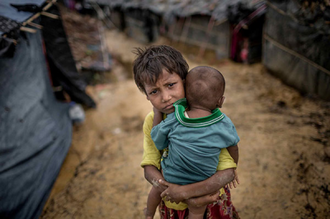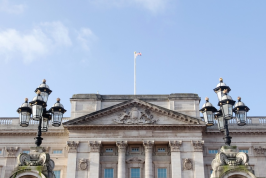Viewpoint: Why you cannot trust politicians with global justice

Rohingya children - image CAFOD
The British Parliament is considering a move that may put justice within reach of persecuted minorities such as Christians in the Middle East. Lord Alton has introduced a bill that would require the British government to ask the High Court to decide whether or not genocide and mass atrocities are taking place.
His private members' bill is significant because it recognises that politicians are swayed by Britain's trade links and other relationships with regimes perpetrating atrocities against their own people.
In the years since the Holocaust, diplomats have shied away from labelling genocide by its rightful name. Under international law (the 1948 Genocide Convention, and the 2005 Responsibility to Protect doctrine), once we recognise genocide is occurring, we have a duty to do something about it. For this reason, Bill Clinton's administration spent the entire 100 days of the Rwandan genocide toying with language to evade taking action. His administration concluded that "acts of genocide" were happening in Rwanda, rather than genocide.
In 2016, as Christians, Yezidis and other minorities were being deliberately targeted and slaughtered by ISIS, the UK House of Commons voted 278 to 0 in favour of recognising that genocide was happening in Iraq. Yet, the British government refused to refer the issue to the International Criminal Court. They claimed that it was "a matter for judicial authorities," not governments to decide if genocide was occurring. When Lord Alton and Fiona Bruce MP pressed to government to explain how the matter could be referred to these "judicial authorities," they found themselves in a Catch 22 or chicken-and-egg situation. The government refused to say whether genocide was being committed by ISIS, yet they also wouldn't explain how the matter could be referred to judicial authorities to make the determination.
Lord Alton's private members bill, introduced today, March 20th, would mandate the government to reflect Parliament's concern about a possible genocide by referring the matter to the High Court. At a meeting attended by representatives of genocide prevention groups, Lord Alton described years of frustration as the UK government changed its approach to massive human rights violations depending on the politics of the moment, rather than a consistent policy. For instance, for many years the Foreign Office expressed concern about both the targeting of the Karen people in Burma and the regime's dismal human rights record. Yet, once democracy campaigner Aung San Suu Kyi was released from house arrest, and Britain restored commercial ties with the regime, the Karen and the Rohingya minorities were no longer deemed worthy of Britain's concern. "Suddenly, it was not such a good idea to put the generals on trial," Lord Alton recalled.
Before she was murdered, the MP, Jo Cox, spoke of a "steady deterioration of ethical norms" among governments who otherwise held themselves up to be moral actors. She cited the world's indifference in the face of massive suffering in Syria as an example. Genocide prevention activists present at Tuesday's meeting discussed the variety of options open to the international community when faced with genocidal regimes, noting the UN had identified 60 different actions that could be taken short of war or "boots on the ground" as it is commonly called.
Campaigners and scholars also discussed how the UN's authority had been eroded by its failure to act in both Rwanda and Bosnia in the 1990s. For a successful prosecution, the Genocide Convention requires evidence that the perpetrator intended to destroy a particular group, in whole or part. In the case of ISIS, intent was clearly present, Lord Alton said, because the insurgents boasted about their intention to kill as many Middle Eastern religious minorities as possible. In less straightforward cases it was appropriate that judicial authorities would take evidence from experts, and then refer examples of alleged genocide to the International Criminal Court or special tribunals. While it was desirable for the local legal system involved to try cases, it was noted that in Iraq, for example, there was no Arabic understanding of the notion of genocide. Lord Alton also stressed that time is of the essence in gather evidence, prosecuting and hopefully preventing further atrocities against persecuted minorities.
See also: ICN 21 April 2016 - Parliament votes unanimously to declare IS/Daesh crimes genocide www.indcatholicnews.com/news/29897
ICN 18 March 2016 - Lord Alton: UK government in complete denial about ISIS genocide www.indcatholicnews.com/news/29670


















